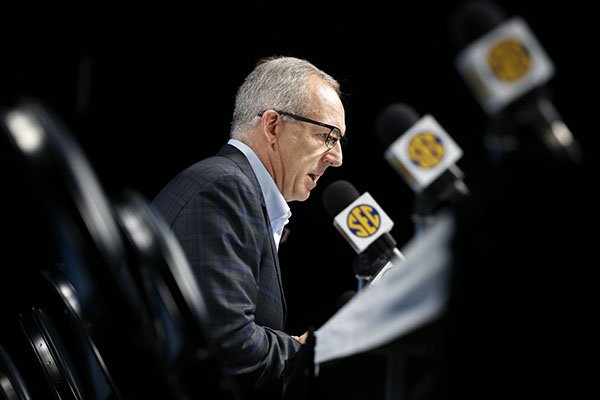HOOVER, Ala. — A little leaner, and maybe a little meaner by necessity, Greg Sankey is not the same man who opened the SEC Football Media Days in 2015 as the league’s new commissioner.
Today he wears more hats than the Kentucky Derby.
Lately he’s been standing up to the NCAA and Congress about athletes’ rights.
On Monday, he spoke about the SEC lacking a minority head coach in football. He mentioned there had been eight new coaches hired in the past two years, and that it was an institutional issue, but one the conference is watching.
His theme yesterday was the same as it was in 2005 when he quoted a Bob Dylan song about times are changing.
Sankey recently signed the SEC up with Disney for a contract that starts in 2024 and will pay half a billion dollars to the league and its members.
He didn’t mention this, but most people know it. Sankey is the man who saved college football in 2020.
While conferences were bailing out, he advocated for patience. Listen to the medical experts.
Finally he got all the data and made the decision.
The SEC would play 10 conference-only games and start three weeks late.
Suddenly players, parents and even some presidents in the Big Ten were mad their seasons had been canceled. The Pac-12 got in motion, and part of that was to eventually get rid of its commissioner.
The Big 12 and ACC were ready, almost like they had been waiting to see what Sankey decided.
There were some postponements, a few cancellations and very few bowls, but the season that almost wasn’t became a reality. And the top team, Alabama, won the national championship.
Sankey was quick to point out the fight with covid-19 is not over.
With determined clarity he said: “Right now, 43% of our football teams have reached the 80% threshold for in-roster vaccination. That number needs to grow and grow rapidly.
“Let me be clear to our fans, to our coaches, to our staff members and to our student-athletes. Covid-19 vaccines are widely available. They’ve proven to be highly effective. And when people are fully vaccinated, we all have the ability to avoid serious health risks, reduce the spread of the virus and maximize our chances of returning to a normal college football experience and life.”
Sankey stared the virus in the face a year ago and refused to lose.
His fight goes on.
His leadership thrust him into a new role in college athletics. One he may not relish but will endure with a stiff upper lip.
He’s publicly asked why the questions surrounding the basketball programs investigated in 2017 have gone unanswered.
He’s emphatically stated it is time for change in the NCAA’s way of doing things, pointing out two years ago the NCAA wasn’t concerned with name, likeness and image, but as soon as the Supreme Court ruled in favor of NIL, the governing body was all for it.
He’s led talks about why schools with $170 million budgets live by the same financial rules of a school with an $8 million budget. He feels that is not in the best interest of athletes.
He’s an advocate for baseball, softball, soccer and other sports having a fair share of scholarships.
He finished off his time at the podium with questions, and his last answer was about the NCAA’s ability “to legislate college athletics programs though the NCAA manual. We can govern some aspects, but 450 pages seems less relevant today than it ever has before.”
Sankey isn’t the new sheriff in town, but maybe he should be.

